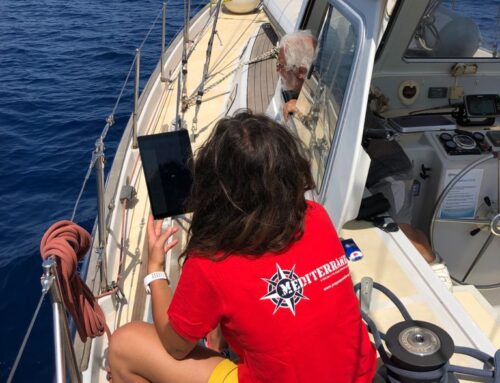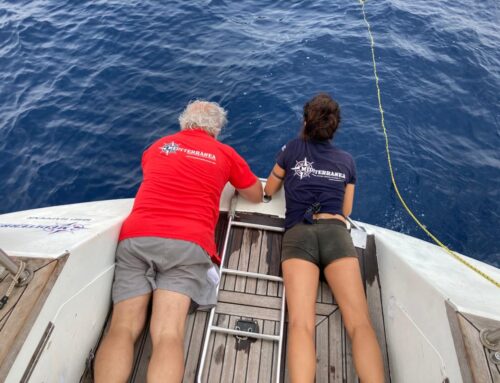
(by Simone Perotti)
“Don’t you think that there is still a great need Vassilis Vassilikos for this world, to interpret reality?” This might appear to be a bit of flattery, but it isn’t. It stems from an immediate liking, which is quite unexpected. I thought that I would be meeting a serious, and somewhat unapproachable intellectual, well aware of his role in the Greek and international panorama. This appointment originated from an initial refusal and was later confirmed thanks to a person who put in a good word, and was then put off more than once…
The ideal recipe for a discordant, difficult dialogue which though interesting, would not be pleasant. The sensations and feelings of an interviewer. The person who walks to meet us on the road however, is a tall thin man, who carries himself well, and introduces us to his wife, an opera singer, who is interested in our research project. A likable smiling man, by no means standoffish, to whom, as a reaction, I ask a question based on what I really think, and which I may have put differently had I been disappointed. Intellectual contortions of the traveller.
His reply is immediately a concrete one: “How do we define realty? Nice problem… Is it what we see on television? Is it digital reality? In the Sixties it was that of books and publishing. realty was written and printed. Today we know the world through images. And then, we have the other problem, who are today’s intellectuals? If today an intellectual isn’t on TV he has no hold on the public. But the intellectuals who count are reserved, they live quietly, you don’t see them, they’re modest. The truth is that intellectuals no longer count as they did in the times of Zola and later Sartre. The only Italian intellectual who counts at an international level is Umberto Eco. But the others?”
Nice start. He is asking questions to answer my questions, rather than giving me answers. “The truth is that we have entered an era of simple things. Things that are complex, and require hard work, attention, study and understanding, are no longer fashionable. Christianity understood that two thousand years ago: ‘Love thy neighbour as thyself’. A nice slogan, simple, direct, something that everyone can understand. A headline, we would say today”.
Vassilikos has not only written 112 books, all lined up behind him. He is the author of ‘Z’, the book that was the forerunner of the Greek events of 67, which Costa Gavras turned into a movie that won an Academy Award and the Golden Palm (‘Z – The orgy of power’ editor’s note), as well as ‘K – The orgy of money’, dating to 1991, about today’s financial economic oligarchy, namely the cause of the recession in his country.
“Coelho, the worst writer in the world, writes simple things, and everyone thinks he is wonderful. In Greece 90% of our readers are women, and thank goodness we have them. Most of these however read romantic novels, sentimental stories, in which they try to find comfort and answers to their daily lives. 15 Euro practically gets them the equivalent of quite a few sessions with a psychoanalyst, which would cost a lot more. If you look at the top selling books in Greece, you will see that there are six or seven authors who have written books that in no more than six months will be completely forgotten. And I know what I am talking about, because I too passed through that simple literature, I too let myself be attracted. So, do you know who the intellectual of today is?”
Vassilikos is anything but laconic. He talks ceaselessly, in Italian, that he hasn’t spoken for quite some time, but which is understandable. “In my days there was a separation between intellectuals who participated, who made sure that their voices were heard, and those who went into seclusion, who kept apart. We criticised them. But then, you see, in the end … they were right. People of my generation were lucky, because when they were young they had ideology. Everything was much simpler. All you needed to be was a left winger and you were one of the good guys”. He laughs, and looks at me rather slyly. But his joke is self-ironic, and perhaps at his age he can allow himself the luxury of dropping a veil on many things. In any case, with this man it is impossible not to speak of society, politics, the life of man.
How did we manage to put ourselves into this blind alley? “It all started with Reagan. I was in the USA at the time. I remember that one day the flight controllers went on strike. At the time there were 4000 flights a day, and they were all cancelled. They were all fired on the spot and replaced by air force staff. That was the last strike in that country. Did you know that? That’s how it all started!” Yes, but then many other things happened. “Certainly, then the financial raiders were born, people who in the three-second time zone between the opening of the Tokyo stock exchange and another stock exchange in the West, without producing anything, became millionaires. Until then money was the end product of production activities. Then it became the cause. Once we used to speak about art for art, here they talk about money for money. And then came Thatcher in the United Kingdom, privatisations … At the time I wrote ‘K’, which was based on a true story. A Mr. Nobody who worked at the Bank of Crete suddenly became the owner of the bank, by buying it internally with his own money. He was the son of Greek emigrants to the USA, he knew how to use a computer etc. That led to the birth of an empire, like that of Berlusconi: newspapers, televisions. Politics permitted him to do all this, adopted and exploited him, and he allowed himself to be exploited. Then one day they sent their inspectors, because everyone was afraid that Papandreou, who was very ill, would die, and that something would come out. Only that the chief inspector who examined the financial statements and the assets of the bank found an account in his name full of money. He had a heart attack and died”.
An incredible story, which is perfectly real, given that it is true. But what were we doing in the meantime Mr. Vassilikos? “Us? Oh, we were getting drunk, buying without paying, without money, that’s why we are accomplices. I agree with what you say about the left wing that believed in class and not the individual and about the Catholic Church that believes in the community and not the individual. This generated a colossal hangover, a sort of widespread irresponsibility. Let me tell you a secret. I also used to buy without paying. I thought that everything was free with a credit card. And do you know what? I am still paying the debt, in monthly instalments”. He laughs, again with the look of someone who can allow himself to admit his faults. Honesty, late as you like, but real.
“The Italian left wing was our model. We intellectuals were all Gramsci supporters that is why we loved Berlinguer. Do you know that once a couple of tourists asked me where they could eat really good lobsters? I told them where to go and that evening by chance I went there too. I thought I recognised the man, then I remembered that his brother had interviewed me. It was Achille Occhetto on holiday with his wife!” Another hearty laugh, but not maliciously.
“But the real push towards communism came with Craxi and De Michelis. I remember that De Michelis used to repeat to us: ‘let’s live the moment, only now exists!’. Good brain De Michelis, pity things went the way they did”.
We speak again about modern politics. About Tsipras, who has ten parties in his party and no one knows what he wants to do or how he is going to do it. About Renzi, pretending (maybe) that he doesn’t know that he is party secretary of the PD, as well as Prime Minister. He tells me about Furio Colombo, a dear friend of his, who three days after the military coup in Greece was the first to report the story and in order to return to Italy exchanged his bag with an American tourist to save his film reels. “When the customs made him open his bag they saw only panties and bras and they let him go through”. Then about philosophy: “The Presocratics, they were the true great philosophers of the XXIth century. They invented reality. Not Plato and Aristotle”. Then about the Mediterranean, and Vassilikos recalls Sarkozy’s initiative for the Mediterranean dialogue: “I never liked him, but that project was very important. When I was ambassador for Greece with Unesco I drafted a splendid project: The Roads of the Olive Tree. Here, look at that” and he gives me a book that I intend to read eagerly. I tell him about the suggestion of a possible united sea, of the United States of the Mediterranean. He appreciates this, and I see a quick but deep flash in his eyes. He speaks about Matvejevich, of a theatre experience that I do not manage to jot down.
Mr. Vassilikos, what do you think of a Mediterranean that is joined, not by Countries but by cities, and thus individuals. “It is absolutely right. The Mediterranean of Countries does not exist, only the cities exist, or rather only the ports, they make sense, they are representative. And listen, and this is something that I did not know, there truly is a difference between North and South. The Mediterranean is the South, and has nothing whatsoever to do with the North. Do you know how you can substantiate what I have just said? You just have to look Shaeuble (current German Minister of Finance, editor’s note) in the face”.
I ask him about Alba Dorata. He grimaces, as though he had a stomach ache. “There is no risk of civil war in this Country. But there is a very serious problem with the Nazis and Fascists, who as a matter of fact represent about 0.8%. Those who vote for them are not fascists, but simply ignorant, with at best middle school education, and despise politics. But it is the media who blow everything out of proportion, who have a gruesome taste for crimes, violence and give these criminals a role”.
Then he asks me questions: about my books, the Progetto Mediterranea, our routes. He asks us if Greek television has taken an interest in us. We tell him that news websites and papers have written about us. “So place a bomb, why not?! That way all the televisions will come and you can tell them about the boat, the trip and the united Mediterranean!”.
We go away laughing.





Leave A Comment